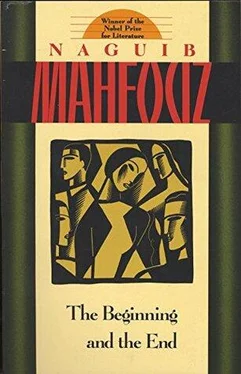Naguib Mahfouz - The Beginning and the End
Здесь есть возможность читать онлайн «Naguib Mahfouz - The Beginning and the End» весь текст электронной книги совершенно бесплатно (целиком полную версию без сокращений). В некоторых случаях можно слушать аудио, скачать через торрент в формате fb2 и присутствует краткое содержание. Год выпуска: 2016, Издательство: Anchor Books, Жанр: Классическая проза, на английском языке. Описание произведения, (предисловие) а так же отзывы посетителей доступны на портале библиотеки ЛибКат.
- Название:The Beginning and the End
- Автор:
- Издательство:Anchor Books
- Жанр:
- Год:2016
- ISBN:нет данных
- Рейтинг книги:4 / 5. Голосов: 1
-
Избранное:Добавить в избранное
- Отзывы:
-
Ваша оценка:
- 80
- 1
- 2
- 3
- 4
- 5
The Beginning and the End: краткое содержание, описание и аннотация
Предлагаем к чтению аннотацию, описание, краткое содержание или предисловие (зависит от того, что написал сам автор книги «The Beginning and the End»). Если вы не нашли необходимую информацию о книге — напишите в комментариях, мы постараемся отыскать её.
The Beginning and the End — читать онлайн бесплатно полную книгу (весь текст) целиком
Ниже представлен текст книги, разбитый по страницам. Система сохранения места последней прочитанной страницы, позволяет с удобством читать онлайн бесплатно книгу «The Beginning and the End», без необходимости каждый раз заново искать на чём Вы остановились. Поставьте закладку, и сможете в любой момент перейти на страницу, на которой закончили чтение.
Интервал:
Закладка:
Only Hassan was unconcerned by religious thoughts. As though he was instinctively pagan, even death itself could not cause them to enter his mind. In fact, he was not influenced by education or any other kind of discipline. By nature he was a tramp, just as his father used to call him when he was angry. His disposition was so frivolous that there was no room in his heart for any creed; rather, religion was often the object of his ridicule and the butt of his jokes. Even the slight religious influence which his heart had once absorbed from his mother had been dissipated by the pains of practical life. Thus his thoughts rambled away from eternity to center on terrestrial existence and on the prospects life presented to himself and his family. But he did not long remain with his two brothers and his aunt’s husband, for in the distance a man appeared, hurrying toward them. No sooner had Hassan seen him than he exclaimed with relief, as if he had been waiting for him, “Farid Effendi Mohammed!”
Although the autumn weather was mild, the newcomer was wiping perspiration from his forehead with a handkerchief. He was extremely fat, with an enormous belly and a round, full face with fine, delicate features. His obesity, old age, and elegant dress gave him an air of dignity of the sort which made government officials, particularly clerks, so proud. The brothers fixed their eyes hopefully on the new arrival, with the reverence to be accorded such a neighbor and old friend of their father’s. The man came up to them offering his condolences.
“Today I took leave from the Ministry,” he said, addressing Hassan. “Let’s go to your late father’s office at the Ministry and cash the funeral expenses. Then we can buy the necessary things.”
He asked Hassan about plans for the funeral and told him to carry them out. Then he took Hassan’s arm and both departed for the Ministry.
FOUR
When it was nearly time for the funeral, Hassanein became very depressed. Deeply disturbed, he forgot his grief. He had hoped for a magnificent funeral, appropriate to his father’s position and prestige. His brothers were not of a type to be much concerned about such a matter, but to Hassanein a degrading funeral seemed as much of a catastrophe as death itself. As much for the sake of his beloved father as for himself, he dreaded the prospect.
He cast his eyes about him, searching the crowd of mourners for a man of stature but found none except Farid Effendi Mohammed, their good friend and neighbor. There was his aunt’s husband, not much more than a laborer; and Amm Gaber Soliman, the grocer, could offer little more. Present also were the barber, even lower in station than these two, and several people whose absence would have been less disgraceful than their presence. He felt disheartened and deeply depressed that no one else should attend his father’s funeral. But he was too impatient: no sooner had the hour struck four than large groups of government employees filled the blind alley until they blocked it. His heart felt lighter and free from worry, and he returned to his grief. Then something unexpected happened. A splendid car suggestive of wealth and luxury drove up and stopped near the house. An attendant stepped out and opened the door for a man whose appearance indicated position and title. He stepped forward, his large body and his fifty years contributing to an air of dignity. The three brothers hurried politely to receive him. Farid Effendi Mohammed accompanied them to have the honor of receiving this great personage, whom he, as a government employee, esteemed more than any other person.
“Is this the house of the late Kamel Effendi Ali?” the newcomer inquired in low voice.
“Yes, sir,” Farid Effendi answered respectfully.
They could offer him nothing but a bamboo chair in the middle of the street, and they were more than a little embarrassed. Hassanein felt relieved by his arrival, yet it annoyed him that the man should ask about the house, for this showed that he did not know where it was. He stepped closer to his brother Hassan.
“Who is that man?” he asked.
“Ahmad Bey Yousri,” said Hassan, “a great inspector in the Ministry of Interior and a good friend of our father.”
“But why, then, did he ask the way to the house as though he didn’t know it?” Hassanein asked, astonished.
Hassan gave him a strange look.
“Our father visited him often, but he…well, you see, he’s a great man!” came the answer.
The young man was silent for a moment; then, correcting himself, Hassan went on: “Our father loved him and regarded him as his best friend.”
Hassanein, not wanting to have his pride deflated, ignored this unpleasant aspect of the situation. He wished that all the people there could see the great inspector. The painful moment came when the bier was carried out of the house. Wailing reached their ears, coming from the balcony and windows. The people lined up to follow the bier, while the two younger brothers, amazed and unbelieving, fixed their eyes upon it. They wept all the way to the mosque. Once there, they turned to thank the people for the trouble they had taken and bade them farewell. When a few offered to accompany the bier to its last resting place, Hassanein whispered to his elder brother, “Don’t allow anyone to come with us!”
He did not want anybody to see the family’s humble burial place. They succeeded in getting the crowd to depart and climbed into the hearse, accompanied only by their aunt’s husband and Farid Effendi Mohammed, who flatly refused to leave.
The car carried them swiftly to Bab el-Nasr and stopped at a place where the graves were situated in the open. Here the dead body of Kamel Effendi was buried in something not much more than a pauper’s grave, not very far from the twisting path that led across the burial ground. Drowned in grief, Hassanein was crying. Despite his grief, from time to time he looked furtively at Farid Effendi Mohammed in shame and resentment; he kept thinking: Had the other pupils known about my father’s death, they would surely have come to offer me their condolences. Some would have accompanied me to this graveyard. Thank God they did not come. No decent burial place! Nothing! Why didn’t my father provide a suitable one for our family?
FIVE
It was almost midnight. When everybody else was gone, the family, the aunt, and her husband sat in the hall. For the twentieth time on that same sad day, their mother was relating how their father had died. Hussein and Hassanein were listening intently, while Hassan, with gloom on his face, was absorbed in his own thoughts.
Hassanein spoke about Ahmad Bey Yousri. As much for the presence of his aunt and her husband as for his own preference not to remember it, he did not mention the inspector’s apparent ignorance of where the family lived. Compassion for his dead father filled his heart, and he kept looking sadly toward the closed bedroom door, in his sorrow and incredulity imagining the empty bed. The mother turned to her children and told them to go to bed.
As they had spent a painful and arduous day, they obeyed her without objection, and went to their room, in which there were three small beds. They left one for their aunt’s husband, who joined them presently, and Hassanein shared Hussein’s bed. They could not sleep. Tenderly and mournfully they kept talking about their father, recalling his last days on earth and his sudden death.
“His funeral was really appropriately dignified,” said Hassanein.
“God be merciful to him. He was a great man; no wonder his funeral was great, too,” Amm Farag Soliman agreed. “The alley was full of people; they crowded the area from the house to Shubra Street.”
Hassanein disliked the man’s voice; he was annoyed by his presence. Then, remembering that the man had seen the bare grave, he said indignantly, “It’s surprising that our father, who spent so much, never thought of providing a burial place becoming to the family.”
Читать дальшеИнтервал:
Закладка:
Похожие книги на «The Beginning and the End»
Представляем Вашему вниманию похожие книги на «The Beginning and the End» списком для выбора. Мы отобрали схожую по названию и смыслу литературу в надежде предоставить читателям больше вариантов отыскать новые, интересные, ещё непрочитанные произведения.
Обсуждение, отзывы о книге «The Beginning and the End» и просто собственные мнения читателей. Оставьте ваши комментарии, напишите, что Вы думаете о произведении, его смысле или главных героях. Укажите что конкретно понравилось, а что нет, и почему Вы так считаете.












